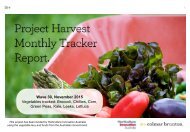potatoes
PA-DECJAN2016
PA-DECJAN2016
Create successful ePaper yourself
Turn your PDF publications into a flip-book with our unique Google optimized e-Paper software.
22<br />
International Update<br />
Swiss potato losses<br />
highlight importance<br />
of quality and<br />
aesthetics<br />
POTATOES HAVE PREVIOUSLY BEEN<br />
FOUND TO HAVE A HIGH RATE OF LOSS<br />
IN SWITZERLAND. POTATOES AUSTRALIA<br />
EXPLORED THE FINDINGS OF A SWISS STUDY<br />
THAT INVESTIGATED THE REASONS BEHIND<br />
THIS WORRYING TREND, DISCOVERING THAT<br />
THE QUALITY OF POTATOES, PARTICULARLY<br />
AESTHETICS, PLAYS AN IMPORTANT ROLE.<br />
Produce losses are always<br />
concerning, as they<br />
represent a loss in potential<br />
revenue for growers. A recent<br />
research study from Switzerland<br />
investigated losses of <strong>potatoes</strong><br />
along the entire Swiss supply<br />
chain, giving an insight into<br />
where the greatest losses<br />
occur and how this might be<br />
minimised.<br />
Leading the study for research<br />
institute Agroscope was doctoral<br />
student Christian Willersinn,<br />
who was moved to undertake<br />
the research after seeing<br />
the results of a British study<br />
that looked at losses of many<br />
different foods.<br />
“They found that, in particular,<br />
<strong>potatoes</strong> have high loss<br />
rates along the entire supply<br />
chain. We thought it would be<br />
interesting to investigate that<br />
single product,” Mr Willersinn<br />
said.<br />
Quantity and quality<br />
The study measured the<br />
quantity of potato losses by<br />
implementing field trials,<br />
interviews with wholesalers,<br />
processors, retailers and<br />
consumer surveys, which<br />
included a 30-day diary. The<br />
quality of lost <strong>potatoes</strong> was<br />
also examined by looking at<br />
technological, institutional<br />
and social drivers, as well as<br />
assessing losses driven by food<br />
safety standards and consumer<br />
aesthetic preferences.<br />
The results showed the<br />
enormous scale of the problem.<br />
In Switzerland, more than half<br />
of all fresh <strong>potatoes</strong> and almost<br />
half of all processing <strong>potatoes</strong><br />
are lost from field to plate. While<br />
Mr Willersinn wasn’t surprised<br />
by these findings, he did note<br />
that it was interesting that<br />
potato quality played such an<br />
important role.<br />
According to the study,<br />
approximately half of all fresh<br />
and processing potato losses<br />
occur due to quality reasons.<br />
These include social drivers<br />
such as preferences for<br />
peeled <strong>potatoes</strong> and aesthetic<br />
expectations; technological<br />
issues such as mechanical<br />
peeling, storage and<br />
transportation; and food health<br />
and safety drivers.<br />
The importance of<br />
aesthetics<br />
More than 66 per cent (nonorganic)<br />
and more than 75<br />
per cent (organic) of all fresh<br />
potato losses, as well as 55 per<br />
cent (non-organic) and 65 per<br />
cent (organic) of processing<br />
potato losses occur due to social<br />
drivers.<br />
“We found out that the<br />
majority of losses are socially<br />
driven by consumer behaviour<br />
or consumer preferences,” Mr<br />
Willersinn said.<br />
“That does not mean that<br />
these losses occur at private<br />
households, but (rather) that<br />
producers and wholesalers sort<br />
<strong>potatoes</strong> according to consumer<br />
preferences.<br />
“We found that just five per<br />
cent of the whole potato harvest<br />
needs to be thrown out due<br />
to food safety and consumer<br />
health. The remaining 20 per<br />
cent, which does not pass the<br />
(Swiss) quality requirements,<br />
would not be a hazard for<br />
consumers’ health, but they<br />
either have bad storage abilities<br />
or they do not pass consumers’<br />
aesthetic expectations – and<br />
others are just unappetising.”<br />
Raising awareness<br />
So what does this mean for<br />
Australian potato growers? Mr<br />
Willersinn explained that quality<br />
is the most important factor to be<br />
aware of, as improved quality will<br />
result in fewer losses.<br />
“The top priority should be<br />
developing methods to improve<br />
the potato quality and thus<br />
minimise the share of <strong>potatoes</strong><br />
that do not pass the quality<br />
standards; for instance new<br />
breeding, improved cultivation<br />
methods, combating wire worms,<br />
etc.,” he said.<br />
However, Mr Willersinn noted<br />
that it is not just growers who<br />
can influence losses.<br />
“Consumers should be more<br />
aware of the value of food,” he<br />
explained. “An effective way (to<br />
minimise losses) might be to<br />
better educate people.<br />
“We found that older people<br />
waste significantly fewer <strong>potatoes</strong><br />
than younger people. Maybe<br />
food has a higher value for them.<br />
Raising awareness of the wasted<br />
amounts might help.”<br />
i<br />
For further information,<br />
please contact christian.<br />
willersinn@agroscope.<br />
admin.ch.








